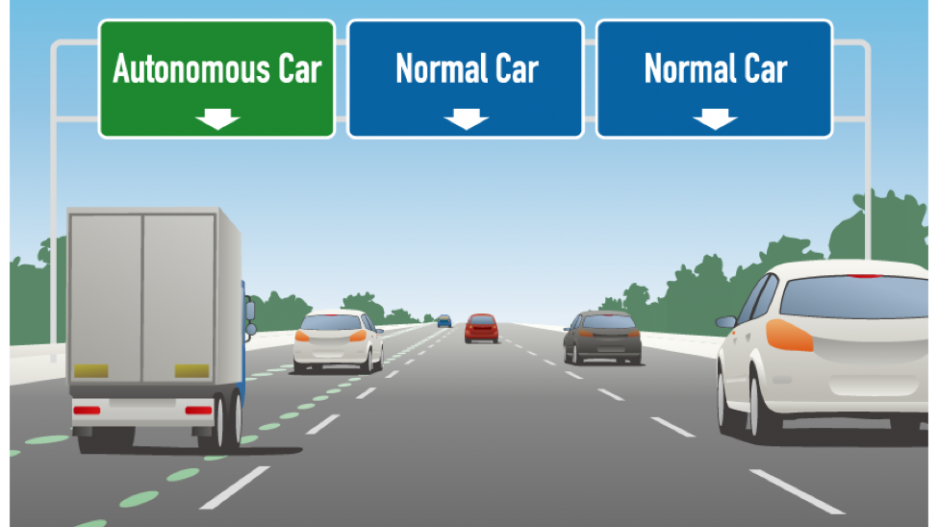Aside from some more dining options or extra rest stops, drivers might be hard pressed to think of ways to make the 2.5-hour commute between Vancouver and Seattle easier.
So what about taking drivers out of the equation altogether?
A report released Monday (September 19) from a group of Seattle-based tech experts suggests autonomous vehicles are needed to better link their city’s economy to their northern neighbours.
The report is pushing for the creation of dedicated traffic lanes for autonomous vehicles throughout the 225-kilometre stretch of highway between Seattle and Vancouver.
“The principal benefit is that it allows drivers to recapture all the time otherwise spent behind the wheel,” the report stated.
“It is difficult to place a dollar value on this but one source has estimated this at more than $1 trillion a year in the U.S.”
Madrona Venture Group’s managing director and report co-author, Tom Alberg, told Business In Vancouver it’s time for the governments of B.C. and Washington state to begin collaborating on a plan to better connect Seattle and Vancouver.
He said a faster, more productive commute would create more tech sector opportunities, especially now that Seattle-based Amazon (NASDAQ: AMZN) and Microsoft (NASDAQ: MSFT) have opened sizeable offices in Vancouver over the past decade.
“Connections between Seattle and Vancouver on the business side, the economic side, lag actually in [comparison] to Seattle and Portland,” Alberg said.
The report, co-authored by former Microsoft chief research and strategy officer Craig Mundie, stated autonomous vehicles could initially share the carpool lanes along the I-5.
Meanwhile, autonomous vehicles could run along Highway 99 between the Peace Arch border crossing and the Bridgeport SkyTrain station in Richmond.
Self-driving cars, which have come under scrutiny for safety concerns, are not currently permitted on B.C. roads.
As recently as this year, the Insurance Corporation of B.C. (ICBC) said it had no records of reports on the potential use, cost/benefit analysis, feasibility and legal, safety and economic implications of driverless vehicles from 2014 to 2016. However, a survey conducted in the spring revealed more than half of ICBC customers are unlikely to buy a self-driving car if they were to go on sale in B.C.
But the report suggests that within 10-15 years, self-driving cars would supplant existing vehicles along the I-5/Highway 99 corridor. Human-driven cars would not be permitted on highways except for times when there is little congestion such as weekends or between 8 p.m. and 4 a.m. on weekdays.
“According to the Insurance Institute for Highway Safety, up to a third of traffic fatalities could be reduced with forward collision prevention and side view assists alone, and greater automation could reduce the United States’ yearly 32,000 traffic fatalities even further by replacing the primary cause of road accidents: human error,” the study stated.
“Furthermore, automated vehicles can accelerate and decelerate more quickly, which improves fuel economy, and would likely greatly enable the use of alternative fuel sources.”
The report’s release comes a day ahead of the Cascade Innovation Corridor Summit in downtown Vancouver, featuring B.C. Premier Christy Clark and Washington Gov. Jay Inslee as speakers.
Former B.C. transportation minister Kevin Falcon joins King County Executive Dow Constantine on a panel discussing the prospects of a high-speed rail linking the regions.
Alberg’s report noted that it would likely cost US$20-30 billion to develop such a corridor.
“The dream of high-speed rail is great,” Alberg told BIV. “It’s unlikely given the cost and the timeframe.”
-With a file from Bob Mackin




